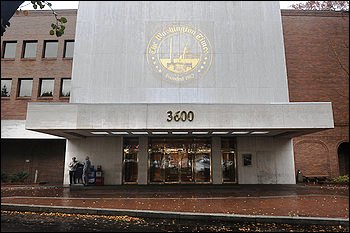![]()
The Words of the Slevin Family
|
|
The Words of the Slevin Family |

The Washington Times, which gained a strong foothold in a politically obsessed city as a conservative alternative to much of the mainstream media, is about to become a drastically smaller newspaper.
Nearly three decades after its founding by officials of the Unification Church, the Times said Wednesday it is laying off at least 40 percent of its staff and shifting mainly to free distribution.
In what amounts to a bid for survival, the company said the print edition will focus on its core strengths: politics, national security, investigative reporting and "cultural coverage based on traditional values." That means the Times will end its run as a full-service newspaper, slashing its coverage of local news, sports and features.
The dramatic move is fueled by both internal church politics and a severe industry downturn that has forced a spate of big-city papers to shut down or declare bankruptcy. It represents a big bet on a digital future, with the Times attempting to chase a national audience while maintaining only a modest print presence in Washington.
The cutbacks are "very sad," the company's new president, Jonathan Slevin, said in an interview. At the same time, he said, "I see a very fine opportunity for the Washington Times to continue to advance the mission of the newspaper as an independent voice in the nation's capital."
The church's leader, the Rev. Sun Myung Moon, was interested mainly in influence, given that the newspaper has lost an estimated $2 billion since its 1982 launch. By attracting such marquee conservative names as Tony Snow and Tony Blankley -- and with reporters who sometimes out-hustled the competition -- the Times punched above its weight class, building a nationally known brand.
But the dream has now been downsized. Beginning early next year, the paper will be distributed free "in select areas," the company said, particularly at federal government offices and other key institutions. Newsstand sales are being deemphasized -- they will take place at fewer locations -- and subscriptions will be discouraged by the charging of "premium prices."
Slevin called it a "good strategy" for "a newspaper whose influence is significant in Washington, D.C, yet whose print audience has never been a major economic driver in Washington, D.C." The paper's daily circulation has recently hovered around 85,000, compared with 583,000 for The Washington Post.
Employees received a letter about the planned layoffs, as required by federal law. Slevin did not rule out layoffs of greater than 40 percent.
The company plans to leverage its conservative editorial pages by expanding its recently launched Web site, TheConservatives.com, and continuing to syndicate its conservative radio program, which is aired in 70 markets. But the opinion pages have also faced turmoil over the firing of editorial page editor Rich Miniter, who has sued the Times and filed a discrimination complaint.
Under its previous editors, Arnaud de Borchgrave and Wesley Pruden, the Times pursued a right-leaning path, with Pruden writing a conservative column while running the paper from 1992 until last year. When John Solomon, a former Washington Post reporter, took over the newsroom this year, he focused heavily on fairness, banning such practices as putting "gay marriage" in quotes and shifting to the word gay instead of homosexual.
Many on the 370-person staff had braced for bad news after the company dismissed three top executives and Solomon resigned last month, but were nonetheless stunned by the depth of the reductions. Slevin, who was named acting president and publisher in the shakeup, said he did not know why Solomon had quit, calling it a "surprise" that came before the current cutbacks were decided. Slevin also said there is no search for a Solomon successor and that his job may not be filled under a reorganization.
The Unification Church, which is suffering its own financial strains, had served notice that its subsidy to the Times would have to be curtailed. In a recent affidavit, Miniter said the church provides $40 million of the paper's annual $70 million budget.
"Having a print newspaper in Washington, D.C., is something that we did not at all consider giving up, unless it became absolutely necessary," Slevin said.
The plan for mostly free distribution mirrors that of the Washington Examiner, which also has conservative opinion pages, and Politico, which publishes a print edition when Congress is in session but draws its national influence from its Web site. The Times plans to work closely with its sister company, United Press International, which is a shadow of its former self.
Slevin would not confirm that the metro and sports sections will be dropped, saying no final decisions have been made. But with the Times pursuing a national audience, he said, coverage of the Washington Nationals or suburban governments would "be of less interest, if any, to someone in Spokane."
Asked about plans to focus cultural coverage on traditional values, Slevin said that meant "freedom, faith and family," with religion being particularly important "to our faith-based readership."